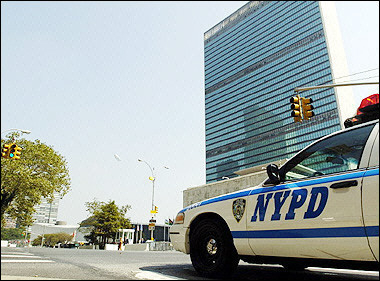|
UN General Assembly OKs compromise document
(AP)
Updated: 2005-09-14 08:31
The U.N. General Assembly on Tuesday adopted a watered-down document on poverty, human rights and U.N. reform for world leaders to approve at a summit this week, after shedding many of Secretary-General Kofi Annan's most ambitious goals during weeks of bitter debate.
The compromise 35-page document is supposed to launch a major reform of the United Nations itself and galvanize efforts to ease global poverty. But to reach a consensus, most of the text's details were gutted in favor of abstract language.
A definition of terrorism and details on how to replace the discredited U.N. Commission on Human Rights were not included. U.S.-led efforts to overhaul U.N. management have been diluted, while nuclear nonproliferation isn't mentioned at all.
"Obviously we didn't get everything we wanted and with 191 member states it's not easy to get an agreement," Annan said. "All of us would have wanted more, but we can work with what we have been given, and I think it is an important step forward."
Annan had gambled that by calling the summit — the largest gathering of world leaders in history — he could push through a list of sweeping U.N. reforms and refocus attention on the Millennium Development Goals, a set of targets for reducing poverty and disease by 2015.

A New York City Police Department car sits across the street from the United Nations in New York.[AFP] |
But diplomats said they had lowered their expectations in the last few days because the issues were too contentious. Still, they called the document a breakthrough after so much debate, especially because many had started the day pessimistic that they would have an agreement at all.
Several were pleased with the creation of a peacebuilding commission and a long section on development. That includes a mention of the desire by "many developed countries" to spend 0.7 percent of their gross national product on development.
"Don't expect Rome to be built in a day, it wasn't," Britain's U.N. Ambassador Emyr Jones-Parry said. "Against the difficulty of this negotiation, its complexity, this is a very substantial gain."
The outgoing president of the General Assembly, Gabon's Jean Ping, presented the compromise Tuesday afternoon in hopes of bridging the deepest divides and moving away from bitter line-by-line negotiations that had bogged down the debate.
Ambassadors including John Bolton said the document was just a step in a long process. It leaves many details for the U.N. General Assembly to settle in the coming months.
"It would be wrong to claim more than is realistic and accurate about what these reforms are," Bolton said. "They represent steps forward, but this is not the alpha and the omega, and we never thought it would be."
Though Annan said he was mostly satisfied, the document was a significant step backward for him. In March, when he had unveiled his proposals, Annan had urged world leaders to expand the size of the Security Council, come up with a definition of terrorism and accept that they have a "responsibility to protect" those being killed, which requires collective action.
And last week, a committee investigating the scandal-tainted U.N. oil-for-food program had called for wide-ranging management reforms. The committee, led by former U.S. Federal Reserve Chairman Paul Volcker, said that the United Nations would need a complete overhaul to tackle programs like oil-for-food in the future.
But efforts to expand the council were abandoned because of longtime national differences. "Responsibility to protect" was whittled down to nations' obligations to protect their own citizens. The document says nations should "make all efforts" toward a convention against terrorism but doesn't try to define it.
Annan called the failure to mention nonproliferation the biggest letdown. The United States had vehemently objected to focusing on disarmament by major powers rather than on the spread of nuclear weapons among rogue states and terrorists, leading to deadlock.
"The big item missing is nonproliferation and disarmament," Annan said. "This is a real disgrace."
He did not mention countries that got in the way of the initiatives he sought.
"There were spoilers also in the group. Let's be quite honest about that," Annan said. "And I must say that during this process in the last couple of weeks, I think some delegations focused on the trees and missed the forest."
The diplomats' inability to agree to a stronger document disappointed non-governmental organizations. They faulted Cuba, Pakistan, Egypt, Iran, Syria, the United States and Venezuela as the nations that created the biggest obstacles.
Rights groups also fear that leaving the tough decisions to the 191-member General Assembly, where even seemingly innocuous initiatives can stall for years, is the quickest way to sink Annan's agenda.
"There is very little to celebrate in the latest UN Summit outcome document," Nicola Reindorp, head of Oxfam's New York office, said in a statement. "We wanted a bold agenda to tackle poverty but instead we have a brochure showcasing past commitments.
Cuba and Venezuela were the only two countries which formally expressed reservations against the document. They protested that the document was pushed through the General Assembly before it was translated from English into the five other official U.N. languages, a violation of U.N. protocol. That gave ambassadors little time to review it.
|